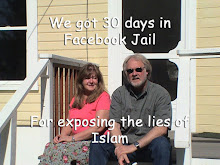The Question of "Jesus Only"
by Dale Brown
by Dale Brown
In an effort to uphold the unity and monotheistic understanding of God, yet disassociate oneself from the words "Trinity" and "Catholic" we often find groups going into the age old heresy of Sabellianism, which is also know as modalistic MONARCHIANISM. Sabellius held that God was one indivisible substance, but with three fundamental activities, or modes, appearing successively as the Father (the creator and lawgiver), as the Son (the redeemer), and as the Holy Spirit (the maker of life and the divine presence within men). In some extreme cases there have been groups who have gone one step further in which the Holy Spirit becomes the church, thus man become "Christ".
Let Me go down and make man in My image
The oneness bible
Harold O.J. Brown, in his book "HERESIES", deals with this third century controversy. By holding to the orthodox teaching of the deity of Christ yet making Him, the Son, a mode or aspect of the Father we are confronted with a few problems. As such, he is fully and truly God, but not a distinct Person. Unfortunately, this suggestion makes it hard to see how Jesus can meaningfully pray to the Father if he is the Father in another mode. Even more serious, it is impossible to conceive of him as our "advocate with the Father" (1 John 2:1) or to be said to "live forever to make intercession" (Heb. 7:25).One might say that the Father, the Son and the Holy Spirit are one and the same yet leave the definition incomplete. If he were to say, "same God", he would be correct. But, if he were to say "same person", he would be incorrect. It cannot be denied that the Father spoke to the Son (Matt. 3:17), the Son spoke to the Father (John 17:1), and the Son spoke of the Holy Spirit (John 16:7), thus identifying three separate persons who co-exist at the same time. In John 1:1-2 we see the Word (who we see as being Christ in verse 14) existing right along side God, at the same time, in the beginning.
The late Dr. Walter Martin claimed that there are two major types of modalists. There are the "logical" ones, who claim that God cannot be both Father and Son and Holy Spirit at the same time and who therefore say that God was first the Father, became the Son, and then became the Holy Spirit. The illogical modalists try to say that the Father, Son, and the Holy Spirit somehow exist at the same time and yet are each other.
Some who hold to the modalistic views are, the United Pentecostal Church (and other Oneness Pentecostals), Branhamism, and Witness Lee and his "Local Church". (The Witness Lee followers have more recently begun to backpedal and teach a more Trinitarian model).
Some might justly object to using the word "cult" in reference to adherents of modalism. Yet, one must still recognize the teaching as a heretical one. So which shall we prefer, the term "cult", which is broad and subject to interpretation, or "heresy", which is possibly more direct and to the point.
Assuredly there are people within modalist groups who have had a legitimate experience with Jesus Christ. It is not the people we have in question. It is the teaching. I have met a number of people who tell me they had an experience with Jesus Christ while they yet attended a Mormon church. They later came to see the error of the Mormon system. God uses whatever is available. Let us be reminded that God spoke through Balam's donkey (Num. 22) but that does not suggest that God would want us to seek counsel from a donkey or ordain one into the ministry.
For those who endorse modalism or any other deviant doctrine of the godhead, there are other serious theological problems that eventually occur. Most vehemently reject the Trinitarian formula of baptism in the great commission, "Go therefore and make disciples in the name of the Father and the Son and the Holy Spirit" (Matt. 28:19), and even suggest it necessary to be re-baptized in the name of Jesus as is seen used in the Book of Acts. With the United Pentecostal Church comes the doctrine that says you cannot be saved unless you speak in tongues. With Branhamism and Witness Lee there is a whole list of additional quirks of legalism etc.
Those who do not learn from history
are destined to repeat it.


Well, I took a trip down that road of discovery. I found many insincere people, and preachers using the gospel for their own ends. I was then alone with you Bible only.
ReplyDeleteNow, I don't intend to belabor you with stupidity. I was studying one morning about the cross and saw this " My God, my God. Why have you forsaken me"
I don't remmembr Jesus calling any name but "my father". Tells me that Jesus died as a man alone and abandoned. In those last moments of life , confused as we all are when we have no other place to seek comfort. Then the end and" Into the hands I commend my spirit. "
What I mean is God cannot die so he had to die as a person.
This comment has been removed by the author.
Delete